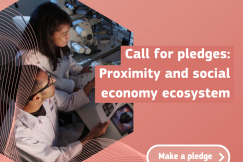Best practices
27 May 2025
Enhancing Digital Industry Efficiency through Circular Economy Principles – Datalog
Best practices
27 May 2025
Transformative Digital Transition
Proximity and social economy
Digital
+15 more
Login / create an account to be able to react
-
2

DATALOG is a non-profit organisation that operates as a Data Altruism Organisation. The organisation aims to combat climate change, by promoting consumer behaviour that serves realisation of the circular economy. Citizens share their personal data regarding housing, and energy and water consumption. In return for their contribution, they are offered personalised consumption reports and recommendations to promote responsible consumption of water, gas, and electricity.
Topics
Spain
Academic / Research and VET Institutions
Business Support Organisation
Company with 250 or more employees
Cluster Organisations
Consumer Organisations
Cultural and Heritage Organisations
Destination Management & Marketing Organisations
EU Institutions
Financial Institutions and Investors
Industry Associations and Chambers of Commerce
International Organisations
Local Authorities
Media / Journalist Organisations
National authorities
Networks and Federations / Confederations
NGOs / Non-profits
Notified Bodies
Regional Authorities
SMEs (a company with less than 250 employees)
Social Economy Entity
Trade Unions
Other
-
Thematic area
-
-
Transformative Digital Transition
-
-
Interlinkages with other sectors
-
-
Proximity and social economy
-
Digital
-
Energy intensive industries
-
Energy-renewables
-
-
Action areas and keywords
-
-
Circular Economy
-
Data Maturity and data driven business models
-
Data sharing, Data management & Code of Conduct
-
Digital Platforms
-
Digital social innovation
-
Local Green Deals, green business communities and citizens’ initiatives
-
Public and private tech partnerships and support
-
Strategy for Data
-
Supporting Digital Social Innovation & Tech for Good entrepreneurship
-
Tech for Good
-
-
Ecosystem focus
-
-
Social economy
-
-
Scope of activity
-
-
Local/neighbourhood
-
Regional
-
Share
Datalog, a Spanish technology company operating within the digital industries sector, has successfully embedded circular economy principles into its operations, offering a compelling example of sustainable innovation in practice.
The company leverages data analytics and IoT technologies to optimise the use of resources, monitor equipment performance, and implement predictive maintenance strategies. This has significantly improved operational efficiency and reduced waste. By shifting towards product-as-a-service models, Datalog retains ownership of its hardware, enabling more effective recovery, refurbishment, and reuse of components at the end of their life cycle.
Sustainability is integrated from the design stage, with products developed for ease of disassembly and recycling. Modular designs and the use of environmentally responsible materials extend the life span of digital infrastructure and simplify upgrades. Datalog also prioritises collaboration with local suppliers and partners, which supports regional value chains and lowers the carbon footprint associated with logistics.
The company maintains alignment with EU circular economy policies and relevant ISO standards, embedding sustainability metrics and continuous improvement into its business strategy. This holistic approach has resulted in tangible reductions in electronic waste, improved energy efficiency, and greater operational resilience, establishing Datalog as a benchmark in sustainable digital industry practices in Spain.
Datalog’s implementation of circular principles is not just theoretical — it has produced tangible results:
- 30% reduction in electronic waste over two years through device refurbishment and reuse programmes.
- 20% increase in energy efficiency across digital infrastructure by using smart sensors and real-time data to optimise power usage.
- Introduction of a Product-as-a-Service model for industrial monitoring systems, allowing clients to subscribe rather than purchase outright. This enables better control over equipment life cycles and supports material recovery.
- Design of modular IoT devices that can be upgraded without full replacement, reducing both cost and environmental impact.
- Creation of a local supplier network for component sourcing and repair services, cutting logistics-related emissions and strengthening regional economies.
Comments (0)
See also
-
21
OECD Private Philanthropy for Development: Data for Action dashboard
- Categories
- Partnerships Transformative Digital Transition Proximity and social economy +24 more
-
5
Transformative Digital Transition Highlights April and May 2025
- Categories
- Proximity and social economy Agri-food Construction +62 more
-
37
Progress report of the proximity and social economy Transition Pathway: Key insights
- Categories
- Regenerative Green Transition Skills Transformative Digital Transition +59 more




